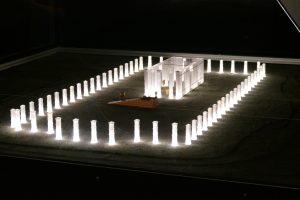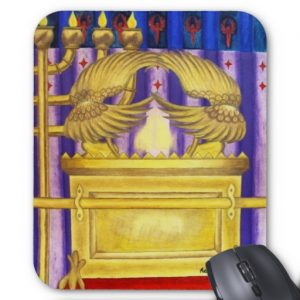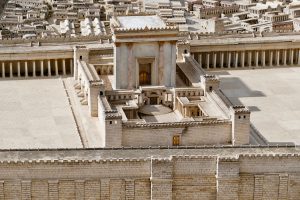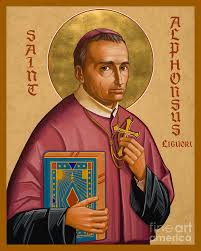HOMILY WEEK 17 04 – Year I
Living Tabernacles and Mutual Indwelling –
Memorial: St. Alphonsus Liguori
(Ex 40:16-38; Ps 84; Mt 13:47-52)
*********************************************
Over the years, Oblate retreat centres have learned the importance of titles for the programs that are offered. Often participants will come because a title caught their attention, created interest, and convinced them to come.
I find the challenge of putting a title to a homily very similar – and today’s is no different. The readings invite us to be tabernacles of God’s presence in the world as we dwell with God and God with us in Christ.

Shiloh tabernacle
When our pilgrim group was in the Holy Land, we were able to visit Shiloh, where the Israelites first built a semi-permanent tabernacle after 39 years of wandering in the wilderness with a portable one, described in the first reading from Exodus today. The uniqueness of this event underpinning all of Judaism, and our Judeo-Christianity, is worth studying more closely.
Moses was instructed by God to set up a tabernacle “on the first day of the month.” To properly understand this, we should think of a that tabernacle as a “portable chapel.” In that chapel (tabernacle) Moses placed the ark (a tabernacle to us) into which he placed the covenant (the Dabar, Words of God, Ten Commandments). This would be the reserved Eucharist for us today. Above the ark he placed the mercy seat, a very interesting feature with two cherubs guarding an empty space in between them, which I believe is really where God was considered to dwell. Think of a monstrance today.

Mercy seat
Then Moses was commanded to set up a curtain to screen this whole set-up, a precursor to the heavy curtain in the later temples separating the Holy of Holies from the rest of the temple. Finally, the glory of the Lord filled the tabernacle (chapel) so much so that Moses was not able to enter the “tent of meeting” because of the cloud and the glory or shekinahof the Lord. Apparently all this was placed within that tent of meeting where God spoke to Moses “face to face.”
Finally, a cloud was on the tabernacle by day and a column of fire by night, and whenever they were “taken up from the tabernacle” the Israelites would continue their journeying through the wilderness, guided by that cloud and fire (think sanctuary lamp today).
What we have here is an extra-ordinary spirituality setting the Israelites apart from other nations – an intimate relationship with God who dwelt among them and journeyed with them on a daily basis. They were to respond to that presence by being an icon of who God is on earth, to draw all peoples to this loving although also fearsome God.
Psalm 84 adds to this spiritual reality, extolling how lovely it is to dwell in the house and courts of the Lord, all the days of our lives. Where the first reading portrays God dwelling among God’s people, the psalm invites us to dwell with God – a mutual indwelling.
In the gospel, Jesus adds a subtle distinction in his teaching about the end of time and the final judgement. The image of a dragnet thrown into the sea that catches fish of every kind, good and bad, needing to be separated, should to be understood in the light of the parable of the wheat and weeds growing together. The angels of the Lord will come out and separate the evil from the righteous and throw the evil into the furnace of fire.
The implication here is that there is no judgement for the righteous, for they have already judged themselves by their lives of faith and goodness, and by “living in the house of the Lord” all the days of their lives. This brings us back to the tabernacle, the ark of the covenant, the mercy seat and the glory of God.

Model of the temple inn Jerusalem
When the first permanent temple in Jerusalem was built and dedicated, the glory of God was again so strong and so filled the temple that the priests could not even enter it. Then over the centuries corruption and sinfulness entered the sacrificial temple religion so much so that the glory of God lifted up and left the temple, heading East. Then came the exile and the destruction of the temple, followed by a return to Jerusalem and the building of a second temple.
However, the glory of God did not return to this second temple when it was dedicated, which always bothered and puzzled the Jews, especially the Pharisees, whose response was to become even more legalistic, thinking if they kept the law perfectly, then the glory of God would return (a flawed spirituality based upon human effort which Jesus consistently had to struggle and teach against).
As the Messiah, one of the roles Jesus had was to restore the temple. We know he cleansed the temple, which had become a corrupt market place unjustly gouging the poor. In so doing, he pointed to himself as the temple that would be destroyed and in three days raised up.
Eventually, the glory of God did return to the temple, but not the physical temple in Jerusalem nor because of the efforts of the Pharisees (who ended up being instrumental in the crucifixion of Jesus). It came upon that little band of believers in Jesus huddled in an upper room after his resurrection and ascension into heaven, as the Holy Spirit in the form of fire and “the sound of a rushing wind that filled the room” – the Pentecost event that was witnessed by people from all parts of the known world at that time.
These are our ancestors in the faith, the first Christian community, born that day through the power of glory or shekinah, the Holy Spirit, coming upon them and making them the new temple, tabernacle, ark of God. We are their descendants and thus also temples where God dwells in us, and we dwell with God.
 Today, the Church honors someone who lived this teaching well, St. Alphonsus Liguori. His life spanned the 18thcentury. Born in Naples, he was ordained in 1726. He soon won a reputation in Naples as a preacher and became widely sought as a confessor. He was committed to preaching sermons that were simple to understand and structured to hold the listener’s attention. In 1732 he went to Scala and founded an order of mission priests that became the Redemptorists. Alphonsus lived an exceptionally holy life. He was a bishop from 1762 to 1775, insisting on the dignified and unhurried celebration of the Mass and the firm treatment of persistent wrongdoers. He was also an outstanding moral theologian,known for his great kindness and concern for others,and won back sinners to the fold by patience and moderation. His Moral Theologywas published in 1748. In his writings, he taught that “God did not spare his Son so that he could spare us” and “All creation is to serve us so that in return we would serve God with gratitude.” He was canonized in 1839 and in 1871 was named a Doctor of the Church. He is a patron of moral theologians and confessors.
Today, the Church honors someone who lived this teaching well, St. Alphonsus Liguori. His life spanned the 18thcentury. Born in Naples, he was ordained in 1726. He soon won a reputation in Naples as a preacher and became widely sought as a confessor. He was committed to preaching sermons that were simple to understand and structured to hold the listener’s attention. In 1732 he went to Scala and founded an order of mission priests that became the Redemptorists. Alphonsus lived an exceptionally holy life. He was a bishop from 1762 to 1775, insisting on the dignified and unhurried celebration of the Mass and the firm treatment of persistent wrongdoers. He was also an outstanding moral theologian,known for his great kindness and concern for others,and won back sinners to the fold by patience and moderation. His Moral Theologywas published in 1748. In his writings, he taught that “God did not spare his Son so that he could spare us” and “All creation is to serve us so that in return we would serve God with gratitude.” He was canonized in 1839 and in 1871 was named a Doctor of the Church. He is a patron of moral theologians and confessors.
The Eucharist is really the mercy seat, that place where God dwells with us and within us, where we experience the mercy of God as forgiveness and healing through word and sacrament.
May our celebration make us living tabernacles mutually indwelling with God, and empower us to be true icons of God on earth, drawing all people back to the Father through Jesus the Son, in the Holy Spirit, with Mary our Mother.




May we place our full faith and ourselves in the covenant and tabernacles just by saying that we are truly devoted to God and our willing to follow his words and the law. We should be like Moses and Jesus Christ who are set to establish the Covenant and Tabernacle ; so his people who follow him can obey his law. We are all sinners until we meet Jesus or God and willing to repent and accept him for who he is . We are willing to change who we are by asking God to forgive our sins and he will heal us for any type of illness that is bothering us for years. So, we are to follow the Ten Commandments and live out the new Covenant by offering the Passover meal . This means we are to take his word and cherish it and do not take it for granted. We are to praise and worship him like he is role model for all of us. We are to be icons of God by bring back people to believe in the Father through his son Jesus Christ and his Holy Spirit . Amen.
Thanks again for inspiring homilies and well written messages . We are to keep Jesus present and alive with in us and out in the open . It is heart warming . Bishop Sylvain Lavoie.